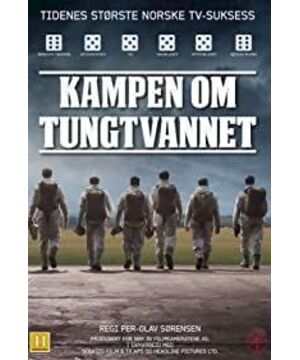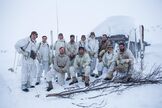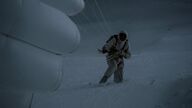I think the show "War on Heavy Water" provides a new perspective for us to study the history of World War II. If I had to summarize one of the show's most salient virtues, it would be "comprehensive" in my opinion. In the play, the histories of both warring parties are presented to the audience in a more objective way. Behind the Allied planes' bombing to stop the Nazi nuclear weapons program, there was a choice at the cost of the sacrifice of civilians; in addition to Heisenberg's plan to study nuclear weapons for the Nazis, there was also his own choice and helplessness. In addition to the numerous games and confrontations, what the audience can experience most is the cruelty brought about by war. Whether for Norway, Germany or Britain, the war brought the loss of life and the destruction of value. The storyline of "War on Heavy Water" revolves around three separate stories on the same timeline. Through the continuous switching of scenes, the tension of this war is well displayed. This war is not only a war between Nazi Germany and Britain and Norway, but also a contest between the two sides and time. Every minute, every second of time, puts oneself in a more disadvantageous position. In order to save the decline, Nazi Germany pinned its hopes on the destructive power of nuclear weapons, hoping to wipe London from the earth with a nuclear bomb "the size of a pineapple". Thus, we can see the Nazis' moribund struggle, where scientific experimentation has devolved into a constant trial and error for quick success, after failure after failure. And on the Allied side, time is not to be wasted in the slightest. Every ton of heavy water produced in Norway has the potential to be the "nutrient solution" that fueled the Nazis' dying struggle. To this end, the Allies even bombed heavy water plants in Norway at the cost of civilian casualties. This is a contest of perseverance and endurance on both sides. Although the Nazi nuclear weapons program has never been completed, the shadow of nuclear weapons has always driven the resistance and sabotage activities of the Allied forces. Even though this "heavy water war" may not be well known to the public, I think it is no less important than other well-known battles. War is cruel and ruthless. Although nearly 80 years have passed since the last world war, the cloud of war has not completely dissipated. In the context of the current high tension in the international situation, the painful lessons of the war in the last century are particularly valuable. The fact that there is no real victor in war can only be understood from a more holistic view of war.
View more about The Heavy Water War: Stopping Hitler's Atomic Bomb reviews











